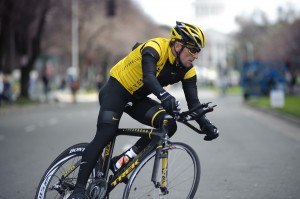Lance Armstrong, the former champion cyclist, asked a judge to throw out a lawsuit claiming he defrauded the U.S. by using banned substances in violation of his team’s contract with the U.S. Postal Service.
 Armstrong, in papers submitted yesterday in federal court in Washington, said the complaint filed against him under the False Claims Act by the U.S. Justice Department is barred by a six-year statute of limitations and that the false statements claim isn’t supported by the law. He’s also seeking dismissal of a second complaint brought by his ex-teammate, Floyd Landis.
Armstrong, in papers submitted yesterday in federal court in Washington, said the complaint filed against him under the False Claims Act by the U.S. Justice Department is barred by a six-year statute of limitations and that the false statements claim isn’t supported by the law. He’s also seeking dismissal of a second complaint brought by his ex-teammate, Floyd Landis.
“The government waited over a decade to file suit against Lance Armstrong for one reason and one reason only: It got everything it bargained for from Armstrong and his cycling team,” John Keker, a lawyer for Armstrong, said in the filing, which referred to “tens of millions of dollars’ worth” of publicity for the Postal Service.
The government, which joined the Landis suit in April, alleges the U.S. paid Tailwind Sports Corp. and its predecessor companies about $40 million through the team’s contracts with the Postal Service from 1998 through 2004. The contracts required the team to refrain from using substances banned by the sport’s governing bodies.
Tailwind used Postal Service sponsorship fees to pay Armstrong’s salary of $17.9 million during those years, according to the complaint. The U.S. is seeking triple damages.
Tailwind Team
Tailwind and Johan Bruyneel, who was director of the Tailwind team, filed requests yesterday to throw out the case. Bruyneel said he would join Armstrong’s motion to dismiss.
Landis doesn’t have the authority to pursue his claims against Armstrong now that the government has intervened, according to a second filing by Keker, of Keker & Van Nest LLP in San Francisco.
“Both complaints are forced to rely on a theory that Armstrong failed to comply with provisions in two contracts with the U.S. Postal Service to which Armstrong was not a signatory and knew nothing about,” Keker said in the motion to dismiss Landis’s lawsuit.
The U.S government was aware of doping allegations against Armstrong’s team being investigated by French authorities in 2000, according to the filing. One month after learning of the probe, the Postal Service entered into a new four-year contract with the team. The government doesn’t allege that the Postal Service sought to have its inspector general or the Justice Department launch its own investigation, which could have prolonged the statute of limitations, according to the filing.
Nine Days
The six-year statute of limitations on the most recent false claim expired nine days before Landis filed suit on June 10, 2010, Armstrong argues.
Armstrong asked U.S. District Judge Robert Wilkins to hold arguments in court on the dismissal requests.
The Justice Department brought six counts of false claims, fraud and unjust enrichment against Armstrong, Bruyneel and Tailwind Sports. An additional breach of contract claim was brought against Tailwind. Tailwind founder Thomas Weisel, one of several additional defendants in Landis’s suit, wasn’t named in the U.S. complaint.
Weisel, a San Francisco investment banker, in a filing yesterday asked Wilkins to throw out the Landis case, arguing that Landis’s complaint includes no facts “that Mr. Weisel knew anything about that doping” or ever submitted any invoice or claim for payment to the Postal Service.
A record seven-time Tour de France winner from 1999 to 2005, Armstrong was stripped of the titles by the U.S. Anti- Doping Agency in August. The cyclist acknowledged in a television interview with Oprah Winfrey in January that he used a “cocktail” of testosterone, erythropoietin and blood transfusions throughout his career.
Lead Rider
Armstrong, 41, made at least $221 million since turning professional, according to a compilation of his earnings by Bloomberg News. He was the team’s lead rider from 1999 to 2004.
Landis, who could receive some of the award if the case is successful, in August admitted defrauding donors to his legal defense fund by falsely claiming that he hadn’t used performance-enhancing drugs during his professional cycling career. The admission was part of a deferred prosecution agreement filed in federal court in San Diego.
Bill Miller, a spokesman for U.S. Attorney Ronald Machen in Washington, declined to comment on the filings. The government’s response is due in September.
The case is U.S., ex rel. Floyd Landis v. Tailwind Sports Corp., 10-cv-00976, U.S. District Court, District of Columbia (Washington).
(Editors: Peter Blumberg, Stephen Farr)
Was this article valuable?
Here are more articles you may enjoy.

 US Will Test Infant Formula to See If Botulism Is Wider Risk
US Will Test Infant Formula to See If Botulism Is Wider Risk  These Five Technologies Increase The Risk of Cyber Claims
These Five Technologies Increase The Risk of Cyber Claims  Why 2026 Is The Tipping Point for The Evolving Role of AI in Law and Claims
Why 2026 Is The Tipping Point for The Evolving Role of AI in Law and Claims  Canceled FEMA Review Council Vote Leaves Flood Insurance Reforms in Limbo
Canceled FEMA Review Council Vote Leaves Flood Insurance Reforms in Limbo 